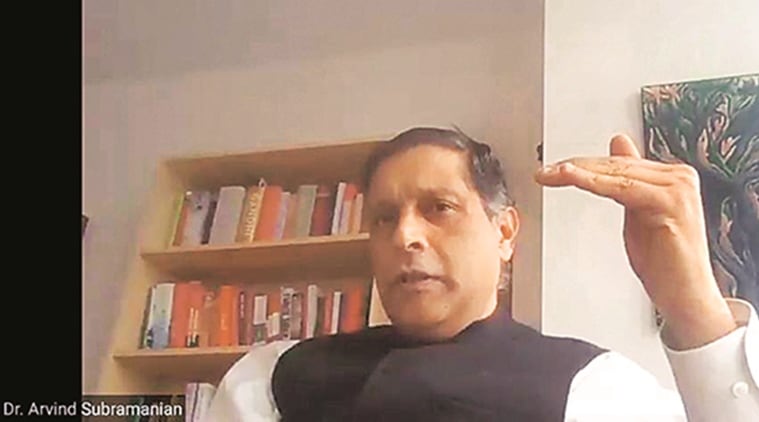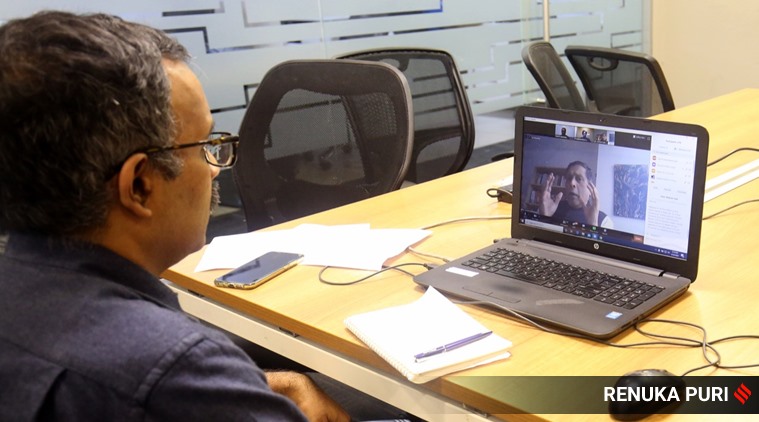 Former Chief Economic Advisor Arvind Subramanian during the E-Adda.
Former Chief Economic Advisor Arvind Subramanian during the E-Adda.
India must plan for substantially negative growth this year and be ready to spend an additional Rs 10 lakh crore since its facing a pralay, or a deluge, “in terms of economic things” following the COVID-19 pandemic, said former Chief Economic Advisor Arvind Subramanian, and now Visiting Lecturer at Harvard Kennedy School.
“We save for a rainy day, and when a rainy day comes, you have to spend. This is not a rainy day, this is a deluge, it’s like the Hindu pralay. This is pralay in terms of economic things… What is all this kind of, you know, prudence for? (It) is not to actually save for a rainy day, but to spend for a rainy day,” he said at the Express Adda, the first e-Adda hosted by The Indian Express.
In conversation with Harish Damodaran, National Editor, and P Vaidyanathan Iyer, Executive Editor (National Affairs), Subramanian said the COVID-19 pandemic came at a time when the economy was already struggling. Terming the IMF growth forecast of 1.9 per cent for this year as mystifying he said, “India was already weakening, the lockdown policies in India have not been any less severe than advanced countries. India has a fiscal response of less than 1 per cent of GDP while advanced counties have a response of more than 8.5 per cent of GDP. I cannot see how even allowing for the fact that India is a more dynamic economy, how India’s growth rate cannot decline by the orders of magnitude that the IMF is projecting for the advanced countries. I think the IMF forecasts for India are absolutely mystifying and bizarre… We should plan for negative, maybe substantially negative, growth rates in this financial year,” he said.
In its recent World Economic Outlook, the IMF estimated India to grow 1.9 per cent in 2020-21, and projected a sharp recovery to 7.4 per cent in 2021-22.
 In conversation with Harish Damodaran, National Editor, and P Vaidyanathan Iyer, Executive Editor (National Affairs), Subramanian said the COVID-19 pandemic came at a time when the economy was already struggling.
In conversation with Harish Damodaran, National Editor, and P Vaidyanathan Iyer, Executive Editor (National Affairs), Subramanian said the COVID-19 pandemic came at a time when the economy was already struggling.
To deal with the unfolding crises, Subramanian said, the country needs additional spending of at least 5 per cent of the GDP (around Rs 10 lakh crore), adding that some part of the fiscal deficit can be financed responsibly through monetisation. But this, he said, should only a “one off” measure. India needs to find the resources to deal with this phase, he said.
Subramanian said the crisis does provide an opportunity for countries to emerge stronger by being decisive or this can even aggravate pre-existing vulnerabilities.
On the kind of fundamental shift he foresees in the post-COVID-19 world, he said, “…certainly on some aspects of globalisation, we are going to see a reversal. Reliance on China is going to come down across the board and that means more de-globalisation… how we regulate FDI is probably going to end up being more conservative. The second thing, of course, is this whole surveillance state. The fact that to deal with pandemics you need to have a more intrusive state to be effective — does the world become what I would call a ‘surveillance on steroids’ states across the board. And this whole move towards populism and illiberalism, I think that, again, is an open question.”
In India, Subramanian said, while the Reserve Bank of India’s steps has left a huge overhang of liquidity in the financial system, it was not getting translated into credit due to the fear of 4Cs – courts, CVC (Central Vigilance Commission), CBI (Central Bureau of Investigation) and CAG (Comptroller and Auditor General).
“The RBI has provided a lot of liquidity, but it hasn’t translated into actual credit flowing to companies. I think the two constraints are: first, who makes those decisions, and I think we need a lot of protection for people to make those decisions. And second, who bears the risk of that lending. There is no doubt in my mind that the risk of lending should be borne by the government in this situation. This could be via a credit guarantee scheme, or a separate government fund, like, in the United States,” he said.
He added the crises would result in a “deflationary shock” for some time at least. “…prices are going to be lower, rather than higher. So, I think we should keep that in mind,” he said.
While cash and food transfers are the equitable safety nets being put to use, he said the Centre and maybe the Fifteenth Finance Commission need to reconsider the needs of the states and think about that. “But meanwhile, one of the quickest ways of getting money to the states would be to increase the deficit financing by the RBI,” Subramanian said.